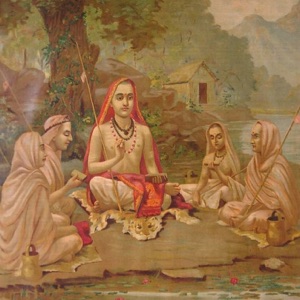
The Upanishads (circa 800 – 200 B.C.E.), a part of the Vedas, are ancient Sanskrit texts that contain some of the central philosophical concepts and ideas of Hinduism. Among the most important literature in the history of Indian religions and culture, the Upanishads played an important role in the development of spiritual ideas in ancient India. The concepts of Brahman (ultimate reality) and atman (soul, self) are central ideas in all of the Upanishads. The word Upanishad literally means “sitting down beside.”

Quotes from the Upanishads…
From unreality lead me to the real, from darkness to the light, from death to immortality.
Different is the Good and different is the dear,
they both, having different aims, fetter you men;
He, who chooses for himself the Good, comes to wellbeing,
he, who chooses the dear, loses the goal.
The Good and the dear approach the man,
The wise man, pondering over both, distinguishes them;
The wise one chooses the Good over the dear,
The fool, acquisitive and craving, chooses the dear.
The sharp edge of a razor is difficult to pass over; thus the wise say the path to Salvation is hard.
He who has found the bliss of the Eternal has no fear from any quarter.
For in our searchings are found all our desires, and we gain victory over our worlds.
He who knows the Bliss of Brahman does not distress himself with the thought, “Why did I not do what is good? Why did I do what is evil?” Whoever knows this bliss regards both of these as Atman (self, soul), indeed he cherishes both as Atman.
That thou art.
Whoever sees all beings in the soul and the soul in all beings…
What delusion or sorrow is there for one who sees unity?
It has filled all. It is radiant, incorporeal, invulnerable…
Wise, intelligent, encompassing, self-existent,
It organizes objects throughout eternity.
Then he realized, I indeed, I am this creation, for I have poured it forth from myself. In that way he became this creation. Verily, he who knows this becomes in this creation a creator.
Of a certainty, the man who can see all creatures in himself, himself in all creatures, knows no sorrow.

